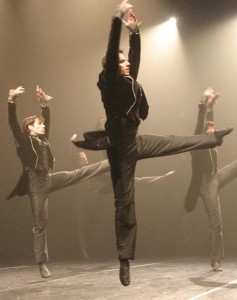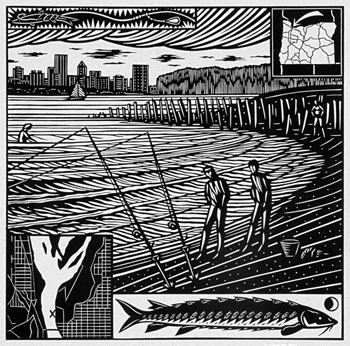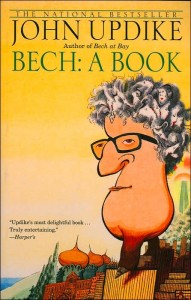 Things have been busy here at Scatter Central the last few days; so busy that we haven’t had a chance to post since we left poor Jean-Paul Belmondo in the clutches of all
Things have been busy here at Scatter Central the last few days; so busy that we haven’t had a chance to post since we left poor Jean-Paul Belmondo in the clutches of all
those nasty French critics. Never mind, Jean-Paul. As far as we’re concerned here on our far side of the puddle, you’ll always throw a mean left hook.
So, time for a little update.
Lar Lubovitch, a genuine. living and working part of American dance history, shows up Wednesday night at the Arlene Schnitzer Concert Hall in downtown Portland, and the White Bird dance series reports it still has good tickets available. The Lubovitch company hasn’t toured in 10 years, and it’s been a good deal longer than that since it’s been in Portland, so this is a good opportunity. The program looks intriguing, and all of the dances are relatively recent: last year’s Jangle, Four Hungarian Dances, set to Bela Bartok’s Rhapsodies #1 and #2 for Violin and Piano; 2000’s Men’s Stories, A Concerto in Ruins, with audio collage and original score by Scott Marshall; and 2007’s Dvorak Serenade, set to Antonin Dvorak’s Serenade in E Major. Plus, Lubovitch will be on hand for a question and answer session after the show.
White Bird has some deals on tickets, including 30-buck Level 3 seats, in addition to its usual student/senior rush tickets two hours before the 7:30 curtain. Details here.
 Over at his alternate-universe home, Portland Arts Watch (or PAW, as we like to call it), Scatter impresario Barry Johnson has been following the proposed merger between two Portland art stalwarts: the financially struggling Museum of Contemporary Craft and the recently vigorous Pacific Northwest College of Art. Good idea? Bad idea? Necessary idea? In his Monday column in The Oregonian and on Oregon Live, Barry comes down with a case of cautious optimism. Read it here.
Over at his alternate-universe home, Portland Arts Watch (or PAW, as we like to call it), Scatter impresario Barry Johnson has been following the proposed merger between two Portland art stalwarts: the financially struggling Museum of Contemporary Craft and the recently vigorous Pacific Northwest College of Art. Good idea? Bad idea? Necessary idea? In his Monday column in The Oregonian and on Oregon Live, Barry comes down with a case of cautious optimism. Read it here.
And speaking of synchronicity (we were, weren’t we?) my review of the craft museum’s two newest exhibits, by installation artist Mandy Greer and textile artist Darrel Morris, will run on Friday, Jan. 30, in The Oregonian’s A&E section and on Oregon Live. Look for it then.
Did we say alternate-universe homes? We’re embarrassed to reveal that only recently have we discovered the second virtual home of one of our best online friends, the ubiquitous and perspicacious Mighty Toy Cannon of the invaluable Portland arts and culture site Culture Shock. Seems MTC also maintains a fascinating, if less regular, music site called, appropriately, Mighty Toy Cannon. From Nick Lowe and Richard Fontaine to Ruth Brown and Sister Rosetta Tharpe, MTC takes a welcome and refreshing curatorial approach to the wonders of the YouTube musical world. Give it a look, and a listen.
 Meanwhile, who’d have guessed that the path to understanding Henry James runs through William Shakespeare’s most infamous stage direction? (That’s “exuent, pursued by a bear,” from The Winter’s Tale, by the way.) The grapevine that slithers through our mutual abode tells us that Part Five of Laura Grimes’ running riff on all things Jamesean, coming Sunday, Feb. 1, in The Oregonian’s books pages and on Oregon Live, is going to be a doozy, complete with Shakespearean bear. In yesterday’s Part Four, Grimes — Friend and Supporter of Art Scatter First Class — gets caught up in a neighborhood book group and unveils a Henry James contest, complete with a prize. Read it here.
Meanwhile, who’d have guessed that the path to understanding Henry James runs through William Shakespeare’s most infamous stage direction? (That’s “exuent, pursued by a bear,” from The Winter’s Tale, by the way.) The grapevine that slithers through our mutual abode tells us that Part Five of Laura Grimes’ running riff on all things Jamesean, coming Sunday, Feb. 1, in The Oregonian’s books pages and on Oregon Live, is going to be a doozy, complete with Shakespearean bear. In yesterday’s Part Four, Grimes — Friend and Supporter of Art Scatter First Class — gets caught up in a neighborhood book group and unveils a Henry James contest, complete with a prize. Read it here.
Portland’s stages have been simply aburst with fresh new work, thanks to the citywide Fertile Ground festival of new plays. At The Oregonian, Scatter friend Marty Hughley kept up with some of the most recent action in Monday’s paper: Read it here.
Scatter’s been hitting the festival, too. We’ve already run our report on Apollo and Vitriol and Violets. And my review of Northwest Children’s Theater and School‘s new jazz version of Alice in Wonderland also ran in Monday’s Oregonian; read it here.
reGeneration: 50 photographers of Tomorrow, a traveling exhibit that’s just landed in the Hoffman Gallery at Lewis & Clark College, is a chilly but pretty darned fascinating look at 50 young photographers worldwide whose work, the shows’s curators believe, will still be vital and important in the year 2025. My review ran in brief in Monday’s Oregonian; for the much more complete version, see it on Oregon Live here.
Finally, we’ve been amused and bemused by the misadventures of operatic tenor Jon Villars, who walked off the stage during a dress rehearsal of Beethoven’s Fidelio at the Canadian Opera Company in Toronto, reportedly because he didn’t like the conductor’s tempo. Here at Art Scatter, we confess to skipping out on a show early a time or two over the years, too. But not when we were part of the cast.
 OK, this one’s a little long, but it tries to get at some important issues of how we organize ourselves, operate in the world, through the lens of two “artist managers,” Seattle’s Anne Focke and the late Joel Weinstein.
OK, this one’s a little long, but it tries to get at some important issues of how we organize ourselves, operate in the world, through the lens of two “artist managers,” Seattle’s Anne Focke and the late Joel Weinstein. RABBIT’S AT REST.
RABBIT’S AT REST. Things have been busy here at Scatter Central the last few days; so busy that we haven’t had a chance to post since we left poor
Things have been busy here at Scatter Central the last few days; so busy that we haven’t had a chance to post since we left poor Over at his alternate-universe home,
Over at his alternate-universe home,  Meanwhile, who’d have guessed that the path to understanding
Meanwhile, who’d have guessed that the path to understanding 





